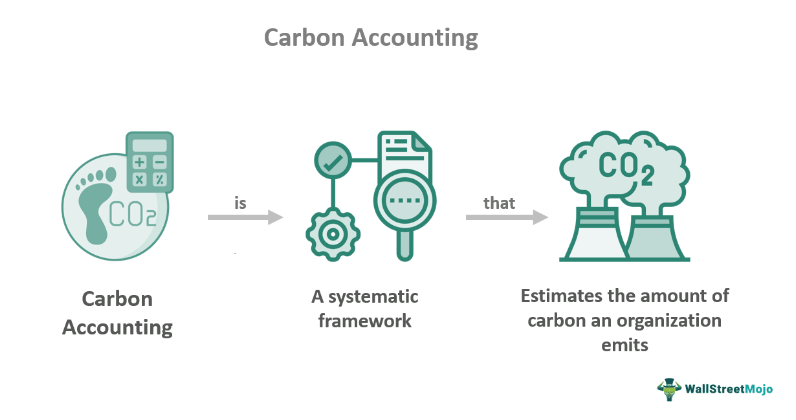Carbon accounting has been established as one of the most vital tools in assessing and monitoring greenhouse gas emissions in the face of global climate change. Carbon accounting has been defined by Wang et al. (2021) as the systematic process of measuring, managing, and reporting carbon dioxide as well as other greenhouse gas emissions produced directly and indirectly by an entity. With the fast growth of green pressure around the world, effective carbon accounting will need to be an organ’s way of explaining the effect on the environment and then working on strategies to reduce this effect.
Importance of Carbon Accounting
Effective carbon accounting is important for reducing global warming. From the 2015 Paris Agreement, it was understood that to limit the increase in average global temperature to well below 2 degrees Celsius and limit additional warming to 1.5 degrees Celsius above pre-industrial levels, such challenging work will require strong and enduring commitment to reducing global emissions through the implementation of Nationally Determined Contributions (United Nations, 2015). Good practices of carbon accounting produce specific, measurable objectives toward the achievement of those aims and enhance environmental claims in terms of the nature of their transparency to the public as it contributes to corporate responsibility.
As India is one of the major contributors of greenhouse gases to the atmosphere, it feels carbon accounting has relevance to achieve its pursuit toward sustainable goals. Development associated with carbon accounting in India are as follows:
- National Action Plan on Climate Change (NAPCC): NAPCC, in 2008, has identified a strategy in accessing climate-friendly technologies offered by the Indian government through carbon accounting initiatives (Ministry of Environment, Forest and Climate Change, 2008).
- India’s Net Zero: India announced that it targets to be net zero by the year 2070, during the COP26 climate summit, that Prime Minister Narendra Modi promised, which requires increasing carbon accounting to see if the country is indeed on track to meet such an ambitious target.
- Carbon Market and Trading Programs: India is actively developing its carbon market. The voluntary carbon market is picking up steam since many states and businesses are looking to capitalize on carbon credits as part of their sustainability plans (The Economic Times, 2023).
- Corporate Sustainability Reporting: SEBI has made BRSR mandatory for the top 1,000 listed companies to display their environmental impact, including carbon emissions (SEBI, 2021).
Frameworks and Tools for Carbon Accounting
1. Greenhouse Gas Protocol: The frameworks utilized by the GHG Protocol should be embraced in organizations to issue detailed guidelines on how to measure and manage emissions that have thus been categorized into three scopes:
Scope 1: Direct Emissions Emitted from owned or controlled Sources.
Scope 2: Indirect Emissions from the Generation of Purchased Energy.
Scope 3: Indirect emissions, other than supply chain and product use.
2. Calculation Tools: Utilize internet carbon calculators and software applications developed specifically for carbon accounting. For example, Calculation Tools of the GHG Protocol may greatly facilitate gathering data and making reports.
3. Data Management Systems: Data management software can be used to aggregate, monitor and evaluate the emissions data. Top-down systems can also include real-time gathering and analysis
4. Technological innovations: Indian companies are very fast adapting to technologically advanced innovations with real-time tracking of emissions. Some examples include TCS’s sustainability data management platform that enables it to combine carbon accounting with other factors of sustainability that have been reported by TCS, 2023.
Establishing a baseline for emissions is crucial for measuring progress against reduction targets. This can be achieved through a carbon footprint analysis that utilizes established methodologies to quantify the organization’s current emissions. Setting SMART targets—Specific, Measurable, Achievable, Relevant, and Time-bound—will provide clear goals for emissions reduction. Additionally, tracking emissions data quarterly or annually is essential to assess the effectiveness of the implemented reduction strategies (Lee et al., 2020).
Organizations can be involved in carbon offsetting works for neutralizing emission from its operation. Investment in Renewable Energy: The sourcing of RECs is feasible to invest in the clean energy sector. India aims to create 500 GW of non-fossil fuel-based capacity by 2030. In relation to this, investment in renewable energy offset may turn to be rewarding (Ministry of New and Renewable Energy, 2021) Support reforestation activities which absorb CO2 from the atmosphere by taking part or sponsoring reforestation activities.
With mounting pressure on emissions disclosure reporting (Young et al., 2023), third parties must look forward to comply with legislations and regulatory policies. Any business entity must align itself with its country’s legislations as well as global legislations regarding disclosure of emission aspects. Further, stakeholder confidence is built by reporting reductions in emissions performance while devising development strategies (Martin & Jones, 2021). Independent assessment of emissions data credibility can be enhanced by introducing third-party auditors (Turner et al., 2020). Apply widely established reporting standards from those bodies which guarantee reporting conforms to best practices. Examples include ISO 14064.
The process of collecting data is pretty challenging, especially in large and complicated organizations. There are various aspects that can be put in place to counter the problems associated with collecting data. One simple way to ensure easy collection is through standardization through data collection templates. The use of these templates will ensure standardization across various departments and suppliers to make collection easier (Davis & Lee, 2021). Good interdepartmental collaboration in that respect is necessary to ensure that data collection is complete. Lastly, follow-through investment in training and building the capacities of employees in tracking and reporting emissions will be necessary for ensuring that carbon accounting is both accurate and effective.
Conclusion
Carbon accounting is something very vital for organizations as they would work towards mitigating climate change and lead in sustainable ways. Carbon accounting will help position businesses at the forefront of the transition to a low-carbon economy, through the measurement and management of emissions based on established frameworks. All this is made possible through opportunities in technological advancement, stakeholder transparency, and the provision of regulatory standards compliance. It is a journey full of many challenges, but, through good practice on carbon accounting, organizations will be put on track toward a resilient and sustainable future.
References
Brown, A., et al. (2022). Understanding Carbon Accounting: What Businesses Need to Know.
Collins, J., & Roberts, L. (2024). Regulatory Changes and Their Impact on Corporate Sustainability Reporting.
Davis, R., & Lee, K. (2021). Navigating the Challenges of Carbon Accounting in Complex Supply Chains.
Fowler, R., et al. (2022). Carbon Offsetting: Best Practices for Businesses.
Harper, T., et al. (2023). The Future of Global Carbon Accounting Standards.
Jiang, Y., et al. (2022). Technology in Carbon Accounting: Harnessing Data for a Sustainable Future.
Lee, H., et al. (2020). Setting Effective Carbon Reduction Goals.
Martin, S., & Jones, A. (2021). The Importance of Transparency in Corporate Emissions Reporting.
Ministry of Environment, Forest and Climate Change. (2008). National Action Plan on Climate Change.
Ministry of New and Renewable Energy. (2021). India’s Renewable Energy Capacity to Reach 500 GW.
Parker, L., & Houghton, R. (2021). The Role of Carbon Capture Technology in Sustainable Business Practices.
Press Information Bureau. (2021). India’s Commitment at COP26: Achieving Net Zero by 2070.
SEBI. (2021). Business Responsibility and Sustainability Report for Listed Companies.
Tata Consultancy Services. (2023). TCS Launches Sustainability Data Management Platform.
United Nations. (2015). Paris Agreement: Framework for Climate Change.
Wang, M., et al. (2021). Carbon Accounting: Fundamentals and Applications.
World Resources Institute. (2020). Greenhouse Gas Protocol: Corporate Standard.
Young, T., et al. (2023). The Growing Regulatory Landscape for Emissions Reporting.
Yuan, J., et al. (2024). Combatting Greenwashing: The Need for Credible Verification in Carbon Accounting.
Zhang, Y., et al. (2023). Analyzing Emissions: The Impact of Carbon Accounting on Business Strategies.
WallStreetMojo. https://www.wallstreetmojo.com/carbon-accounting/


